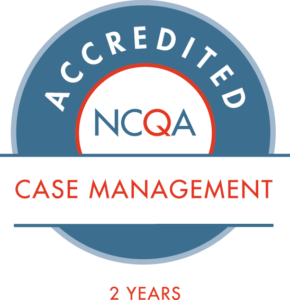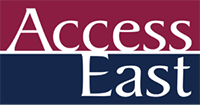
NCQA Accreditation
In August 2024, the National Committee for Quality Assurance (NCQA), among the nation’s leading health-care accreditation agencies, awarded the Access East Medicaid Care Management (CM) program the NCQA’s two-year accreditation for CM.
Please note that we use the terms “case management” and “care management” interchangeably here, and across the Access East website.
NCQA CM Accreditation marks the successful completion of a voluntary multi-year review process for the Access East Medicaid CM program. NCQA’s high standards encourage CM organizations like our own to continuously improve the quality of services we deliver.
CM accreditation “demonstrates an organization’s commitment to the highest degree of improving the quality of (its) patients’ care,” notes NCQA President Margaret E. O’Kane.
In specific, two-year accreditation recognizes organizations like Access East that demonstrate the functions outlined in the NCQA’s “Required Standards for CM Accreditation,” as laid out below, and also to help promote, among other things:
- Developing and employing efficient, cost-effective CM processes and delivery of services
- Effectively managing patients as they move between care settings like hospital to home
- Using patient-centered assessments to determine patient care needs
- Developing personalized, patient-centered care plans
- Protecting patient health information
The NCQA intentionally sets its standards high, the organization states, “to encourage organizations to continuously enhance their quality and achieve the highest level of performance possible, and to create an environment of continuous improvement.”
Required Standards for CM Accreditation
Program Description
Uses up-to-date evidence-based information to develop its CM program, and regularly updates the program with relevant findings and information.
Patient Identification and Assessment
Systematically identifies patients who qualify for its programs.
Care Planning
Coordinates services for patients through the development of individualized care plans.
Care Monitoring
Has systems in place to support CM activities, and monitors individualized care plans.
Care Transitions
Has a process to manage care transitions, identify problems that could cause care transitions and prevent unplanned transitions, when possible.
Measurement and Quality Improvement
At least annually, measures patient satisfaction, program effectiveness and participation rates.
Staffing, Training and Verification
Defines staffing needs, provides staff with ongoing training and oversight, and verifies health-care staff credentials.
Rights and Responsibilities
Communicates its commitment to the rights of patients and its expectations of patients’ responsibilities.
Privacy, Security and Confidentiality Procedures
Has procedures to protect the privacy of patients’ health information.
Delegation
Provides written documentation of each delegated arrangement.
The NCQA developed the above standards with input from researchers in the field, as well as its Case Management Expert Panel and standing committees, employers, various representatives with existing CM programs, state and federal regulators, and other experts.
